Orthodox shift. What is happening in the church life of the country during the war
As a result of Russian aggression, contradictions tear apart the UOC-MP; some priests want independence and are outraged by Patriarch Kirill. However, the senior clergy are wriggling around like a frying pan to come up with arguments about why they should remain under Moscow's leadership.
Before reading, please mind, that's the original article was published in 2022 but data are actual today.
The last two years, which coincided with Volodymyr Zelenskyy's presidency, seemed to forever reverse the trends that began under Petro Poroshenko. The new government has safely buried any mention of the creation of a single local church in Ukraine. Moreover, for the first time in six years, people associated with the Ukrainian Orthodox Church of the Moscow Patriarchate took the top positions of power. No one expected anything else.
With the emergence of the OCU, changes in church life could be seen with the naked eye. Since the December 2018 Unification Council, the number of transitions from the UOC (MP) to the Orthodox Church of Ukraine, recognized by world Orthodoxy, has been growing like wildfire. Thus, in January 2019, 152 parishes transferred, and in February — 243. However, in just a month, the trend changed dramatically, and in May 2019, there was only one transfer. Perhaps nothing is surprising if we recall that it was in May of that year that a new president, Volodymyr Zelenskyy, headed the country.
Soon, the situation began to resemble what had happened under Viktor Yanukovych: there was information about high-ranking officials attending services in UOC-MP churches, and at the same time, there were reports of difficulties with re-registering communities to the OCU. Some Russian propagandists, who had not been seen here for a long time and who, for some reason, showed great interest in the religious life of the neighboring country, began to visit Kyiv.
But everything changed very abruptly on February 24, 2022 — and the reason for these changes, of course, was the Russian missiles and shells that fell on the heads of Ukrainian believers. A great war began, and with it, significant changes occurred in the country's church life.
Map of transitions from the UOC-MP to the OCU. Move the slider below the map to see the dynamics over time. Larger points represent transitions for the selected date. By clicking on a point, you can see additional information: names of communities and dates of transitions.
The number of parishes transferring from the UOC-MP to the OCU has again increased sharply. In February 2022, only one such transition was recorded; in March, there were 54; in April — 104, and in May — 229 transitions.
At the same time, it should be remembered that the total number of parishes of the UOC-MP is currently about 11,500. And the number of OCU communities is about 7.5 thousand. According to Wikipedia, from December 2018 to September 2022, 1151 communities moved from the UOC-MP to the OCU.
Disguise
All this, of course, has exacerbated the already tense relations between the two churches. It has also actualized the long-standing disputes over who should decide to transfer. The UOC (MP) insists that only active parishioners are responsible for such decisions. But then all the other believers who may not go to church every Sunday but also bring their donations there are effectively cut off from religious life. And who voice more and more uncomfortable questions to their priests.
Against this backdrop, on May 27, the UOC-MP Council held a meeting to adopt a new church charter. According to it, the decisions of the Bishops' Council of the Russian Orthodox Church are no longer binding on the UOC, the rector of the UOC is no longer a member of the Synod of the ROC, and the UOC no longer commemorates the Patriarch of the ROC as its "master." However, the Council failed to condemn the position of Patriarch Kirill (Gundyaev). The charter itself also refers to the charter of Patriarch Alexy, which very clearly states: “The Ukrainian Orthodox Church is united through our Russian Orthodox Church with the One, Holy, Catholic and Apostolic Church...”. This phrase emphasizes the connection of the UOC with world Orthodoxy through the Russian Orthodox Church.
Other strange things happened with the aforementioned Council decision — first of all, the new Statute was not published on the official resources of the UOC (MP). The public could read its text only by contacting the State Service of Ukraine for Ethnic Policy and Freedom of Conscience. In other words, the Statute was allegedly adopted, and some decisions are available, but where exactly to read them is a problem.
This, in fact, reflects the entire situation with the UOC (MP). Some priests have stopped commemorating Kirill, while others continue to do so. That is why critics of the UOC (MP) continue to accuse this church of not having started a real movement "away from Moscow."
Dmytro Horyevoy, religious scholar, director of the Center for Religious Security
— We see that the Kremlin is using the UOC-MP as a soft power instrument. Of course, we cannot say that 90% of its priests are collaborators; there are few open agents among them, but the rest also work in a way that undermines the national identity of Ukrainians. They preach a kind of cosmopolitanism, saying that it doesn't matter what nationality you are; the main thing is to believe in God and be humble. In the ordinary world, there is absolutely nothing wrong with this; many religious organizations preach cosmopolitanism. But when it comes to the war for national identity, symbols, and historical heritage, those who undermine national identity actually become accomplices in the crime.
There are not many open agents in the UOC-MP, but others also work in a way that undermines the national identity of Ukrainians.
We see a striking difference between the Moscow Patriarchate in Russia and Ukraine. The Moscow Patriarchate in Russia supports its state and people and works to establish Russian national identity as much as possible. The Moscow Patriarchate in Ukraine says that identity is not important; one must be kind and humble. The Moscow Patriarchate in Russia supports mobilization and calls for people to go kill Ukrainians, while the same patriarchate in Ukraine convinces people that they should not resist. Not all of them, of course, but some do say so.
Representatives of the UOC-MP can convince us of their pro-Ukrainian position as much as they want. But we don't see the identified collaborators in the UOC-MP being held accountable by the church.
Indeed, the accusations of collaboration are among the most serious against the clergy of the UOC-MP. At a time when many priests of this church are actually helping injured civilians and Ukrainian soldiers, there is constant talk of collaboration among UOC-MP priests. Texty.org.ua decided to investigate this issue.
Collaborators
It is worth emphasizing that staying in the occupied territory with your flock and conducting worship is not a crime. According to information from the field, not only priests of the UOC (MP) but also priests of the Roman Catholic and Greek Catholic churches, and sometimes even priests of the Orthodox Church of Ukraine, have been and still are in the occupied territories.
However, there is a key difference in their status from that of the Ukrainian Orthodox Church. While the former's activities were at their own risk, i.e., they were their private initiative, the UOC-MP turned out to be a fully legitimate structure in the eyes of the Russian occupiers.
The UOC-MP turned out to be a completely legitimate structure in the eyes of the Russian occupiers.
Texty.org.ua decided to ask Oles Kobets, executive director of the NGO Association of Ukrainian Peacekeeping School, how all this happened in the occupied Kherson region. Before the occupation, he worked on civil society issues in the Kherson region.
"When the aggression began on February 24, the clergy behaved quite differently. Many Greek Catholic and Roman Catholic priests left in the first days of the war. Some of them did not have Ukrainian citizenship, such as Polish priests, so of course, they tried to leave the occupied territories as soon as possible. Priests of the Orthodox Church of Ukraine mostly stayed in place in the early days, at least until the story of the OCU priest Serhiy Chudynovych, who was detained and abused by the occupiers (but managed to leave later). This story impeded the OCU priests from leaving the occupied territories more actively.
As for the UOC (MP), the leadership, Metropolitan Ioan (Siopko) of Kherson and Tavria, has been in Kyiv since mid-June, and I have not heard much about Metropolitan Filaret (Zverev) of Novokakhovka and Henichesk. In general, I have no information about any pro-Russian views of the local UOC-MP leadership. However, again, it is difficult to talk about this because they have not publicly demonstrated a clear position.
However, Gennady Shkil, a priest of the UOC-MP from Hola Prystan, clearly holds a pro-Russian position. He openly supports the occupation and the war. The clergyman appears in propaganda videos of VTB-Plus, which works for the occupiers.
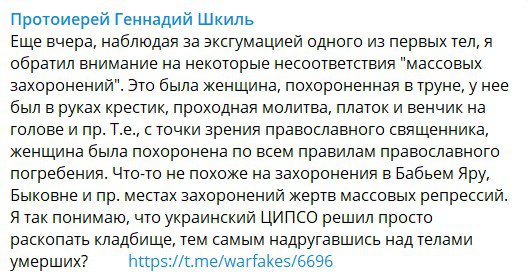
Excerpt from Gennady Shkil's telegram channel. The priest is the author of several blatant statements that not only clearly demonstrate his collaboration but are attempting to justify the crimes of the Russian occupiers against humanity.
But there are other cases regarding this denomination: in a village near Kherson, a priest of the UOC-MP buried a terrorist fighter. The occupation administration learned about this and, searched his house and humiliated him. So, the situation is not black and white.
In general, I would call the UOC (MP) behavior in the occupied territories hybrid. Obviously, we cannot accuse the leadership of the Kherson diocese of collaboration because they left. There is also no mass collaboration of priests in the parishes, so we have a hybrid phenomenon - somewhere it is, somewhere it is not.
However, the part of the UOC (MP) that remained in the occupied territories is legitimate for the occupiers. In the occupied territories, clergymen of the UOC (MP) are invited to various celebrations using Russian calques.
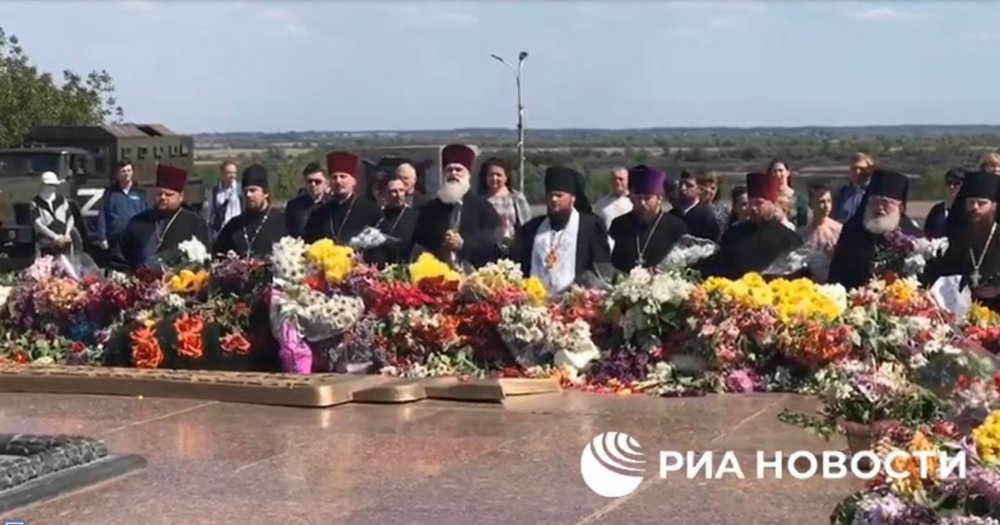
For example, on May 9, a prayer service for those who died in World War II was held in Kherson on the Walk of Fame, attended by clergy of the UOC (MP). The prayer service was held against the backdrop of the occupiers' military vehicle with the symbol "Z."
It is also obvious that the collaborators' top local administrators were parishioners or sympathizers of the UOC (MP). I did not see any Protestants or Catholics among them, let alone sympathizers of the OCU. This includes the well-known collaborator Saldo, who helped to restore the Assumption Cathedral in Kherson at considerable expense.
Today, we see neither the official position of the leaders and bishops of the UOC-MP nor their official statements. Therefore, we cannot say whether they are truly a Ukrainian church or just opportunists. I would very much like to see a decree from the top of the UOC-MP banning priests who collaborate with the occupiers from the ministry. There is a term in Orthodoxy called "banning from ministry." That is, this school should have been banned from serving for its open support of the aggressor. But this is not done."
However, the list of priests-collaborators of the UOC-MP is not limited to the Kherson region. Let's go through the most significant among them - those who are on everyone's lips.
The Metropolitan of Izyum and Kupyansk disappeared but soon resurfaced in Russia.
One of the places of honor here can be awarded to Metropolitan Yelisey (Ivanov) of Izum and Kupiansk, who not only actively participated in various activities of the occupiers but also managed to bless the chief governor of the Kharkiv region, Vitaly Ganchev. After the offensive of Ukrainian troops and the liberation of the Kharkiv region, the Metropolitan disappeared, but, as it turned out, not for long. He soon resurfaced in Belgorod, Russia. The leadership of the UOC-MP should have suspended the Metropolitan from his duties, but we have not seen any public assessment of the collaborator's actions.
He may be competed by another church leader, currently Metropolitan Panteleimon (Povorozniuk) of Luhansk and Alchevsk. This dignified clergyman, or a person who looks very much like him, appeared during a live broadcast in the Kremlin, where Russia's illegal annexation of the occupied Ukrainian territories was announced.
Texty.org.ua has not been able to find any official information on the reaction of law enforcement agencies to such activity by these metropolitans in the occupied territories. The Prosecutor General's Office told the publication that they do not disclose such information.
"Doves" of peace
However, in addition to outright collaborators, there are other figures who can be conditionally called "diplomats." They do not seem to represent the interests of the "Russian world" and even in their sermons mourn the murdered innocent victims, but at the same time pursue a line that would obviously be very popular with the Russian occupiers.
This is what Metropolitan Luke of Zaporizhzhia wrote on his TV channel: "When I hear the proud words that 'slaves are not allowed in paradise,' I recall the words of the Virgin Mary to the archangel Gabriel: "I am the Lord's servant." <...> Without humility, a person can have only one title - a slave of the devil. The definition of this slavery is as follows: "Man —it sounds proud." This is what brought us to the brink of nuclear war."
Metropolitan Luke criticizes the resistance of Ukrainians to attempts to turn them into slaves.
In fact, the Metropolitan skillfully transcends the paradigm of the Russian-Ukrainian war. It begins to philosophize about allegedly universal things, but in reality, he criticizes the resistance of Ukrainians to attempts to turn them into slaves. Earlier, the same telegram channel compared Ukraine under aggression to the cities of Sodom and Gomorrah. However, after the bombing of Zaporizhzhia, the Metropolitan wrote that the crimes of those who bombed his city could not be justified by anything. However, he never used the word "Russians."
Another church leader of the UOC-MP who is "out of politics" is the abbot of the Kyiv Cave Monastery, Pavlo (Lebed). Recently, an audio recording was posted on social media allegedly with Father Pavlo's voice scolding a clergyman who criticized Russian President Vladimir Putin. Unfortunately, no one has authenticated the voice on the recording so far, although people who have heard Pavel live say that the voice is very similar. And if you look a little bit into history, there is nothing surprising about this position of the Lavra's abbot.
The fact is that Pavlo (Lebid), like many other metropolitans of this church, may have a personal opinion about Putin. At one time, the Russian dictator visited the Kyiv Cave Monastery and even personally awarded many leaders of the UOC (MP).
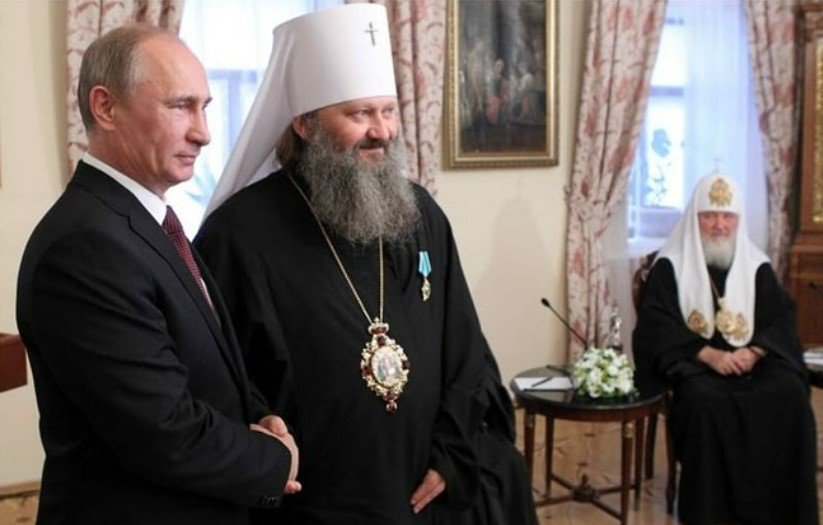
Metropolitan and Abbot of the Kyiv Cave Monastery Pavlo (Lebed), Vladimir Putin, and the head of the Russian Orthodox Church Kirill.
Internal opposition
Andriy Pinchuk, a priest from Dnipropetrovs'k, UOC (MP), volunteer, initiator of the clergy's appeal to the rectors of the Eastern churches to bring Patriarch Kirill to an international church tribunal
At the beginning of the conversation, Father Andriy immediately objects to the use of the prefix MP to the abbreviation of his church, the Ukrainian Orthodox Church. According to him, "the UOC today finds itself in a canonical vacuum, it has no status and claims independence."
According to Father Andriy, his church has almost completely lost its connection with the Moscow Patriarchate after the decisions of the May Council:
— "This Council can truly be called revolutionary. I am sure that time will pass and it will go down in history. I have talked to many priests and bishops, and no one expected such progressive and anti-Moscow decisions of the Council. All of these decisions - about not commemorating Kirill (during services - ed.), about their own peacemaking, about the promotion of parishes abroad - were agreed upon by all of them.
Only one decision, very important to me personally, was not adopted at the Council. It was the decision to condemn Kirill's position. There was an extremely fierce struggle for him. Some people defended Gundyaev very loudly.
But it should be understood that we will not be able to implement all these decisions at once; it will take some time. For example, it is impossible to replace all the antimensions (a consecrated handkerchief with a piece of the relics of saints sewn in for service) at the same time. In fact, a priest's document confirming his authority to perform ministry - ed.) Because every antimension in every church bears the blessing of Patriarch Kirill. That is, 10 thousand of these antimensions need to be replaced. But last week, many antimensions were already consecrated that do not mention Kirill.
Father Andriy admits that his church is facing many global challenges. He belongs to the wing of the UOC-MP priests who really want to separate their church from the Russian church as much as possible. This is the main reason he launched the initiative to hold a church trial of Patriarch Kirill.
— "I was the initiator," says Father Andriy, "but I had previously talked to some priests and lay people whose opinion is important to me - they shared my pain and my desire to initiate this appeal.
According to him, the church tribunal is a meeting of the leaders of five churches: Constantinople, Alexandria, Antioch, Cyprus, and Jerusalem. This format allows the rector of any church to be tried. Within its framework, he is usually not convicted because there are no mechanisms for his conviction.
— So far, this appeal has collected more than 400 signatures from the clergy of the Ukrainian Orthodox Church in the rank of priests. There are no laity, but there are no bishops either. If there were at least one bishop's signature, the appeal would have a completely different sound. But even those bishops who supported the appeal have not signed it yet," Father Andriy is upset.
More than 400 signatures of UOC priests have been collected under the appeal for a church trial of Kirill. There are no laymen among the signatories, but there are no bishops either.
He explains the reason as follows:
— "All churches in the Soviet Union have a very strong corporate solidarity, which the clergy adhere to even when it is criminal. This is an inheritance from the imperial Soviet times. If a bishop sees that certain things are not in line with the spirit of Christianity and church tradition and realizes that he must speak out against it, but at the same time realizes that other bishops do not support him, he will remain silent.
At the same time, according to him, "many bishops of the UOC during the war changed their position on the dialogue with the OCU and whether we need to move towards the independence of the UOC. Now, this movement has only strengthened; I would call it "as soon as possible and farther away from Moscow."
— "Of course, there are certain problems with the decision not to commemorate Kirill," states Father Andriy. "There are cotton parishes and cotton dioceses that continue to commemorate Patriarch Kirill on principle or even expel priests who do not do so. However, we must understand that the movement for the independence of the church has already begun and is gaining momentum, and the movement to establish relations with the Patriarchate of Constantinople is also underway.
The UOC is a very diverse religious organization. And it is too large to be united in all matters. Give it time, the movement has begun. You have to understand that the UOC has a very large proportion of honest, good and pro-Ukrainian priests. And they are constantly asking, talking, demanding independence from Moscow from the church leadership of the movement.
The UOC has a church court. I think it should start a church prosecution for collaborationism of clergy, depriving such clergy of both their dignity and monasticism. Clean out these Augean stables and get rid of the "Ruskomir's" baggage.
And we desperately need help today. We need to put collaborating priests in the dock so that those who are now hindering the movement of the UOC toward a single independent church can be tamed. If the church itself cannot do this, then let the state tame them and somehow level such things because the state can do this if it is willing.
It is, of course, difficult to disagree with Father Andriy's words. It is also difficult to sympathize with his vision of the church's further development and optimism. However, there is one caveat. Today, the appeal to bring Patriarch Kirill to the church court has only 400 priests' signatures. This is from a church that has about 11,500 clergy. And not a single signature of the bishops. Perhaps the majority of priests believe that Patriarch Kirill, who actually declared a real Orthodox "gazavat" against Ukrainians when he said that the death of the occupiers in Ukraine "washes away all sins," does not deserve to be tried? The answer to this question, like many others, is up in the air.
Spiritual brothers
Back in the days of the Soviet Union, the clergy of the Russian Orthodox Church and the KGB, let's say, established reliable contacts, and with the proclamation of independence, these strange relations grew into strong relations between the church leadership of the now UOC-MP and the former communists who became the authorities.
This symbiosis flourished under President Yanukovych, with strong ties between senior officials and pro-government oligarchs on the one hand and the UOC-MP on the other.
January 19, 2014. A festive service at the Kyiv Pechersk Lavra. The photo shows Prime Minister Mykola Azarov and then-President Viktor Yanukovych. A smiling Vadym Novynskyi looks out from behind them.
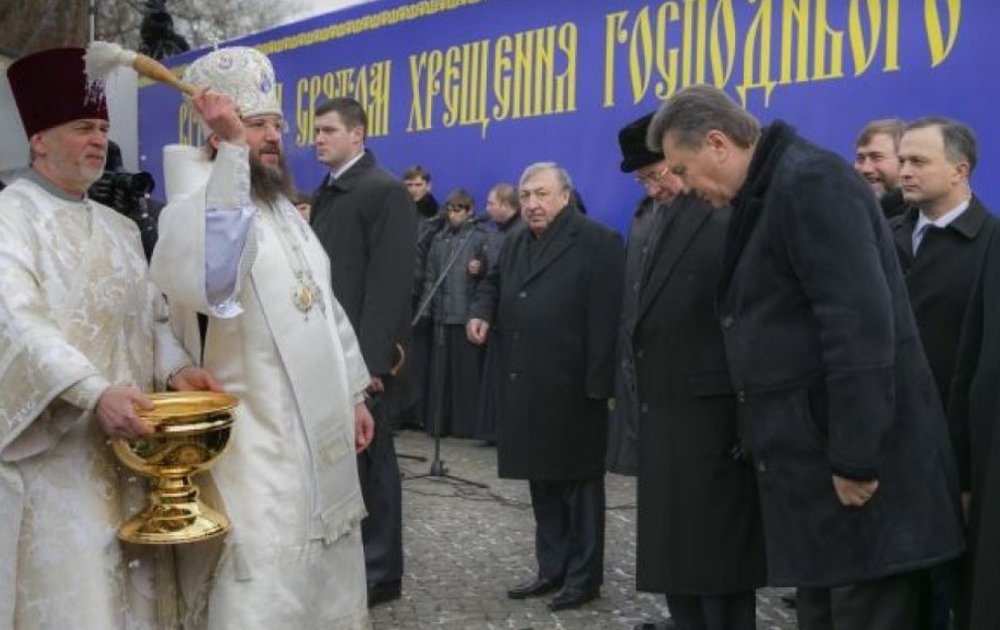
Prime Minister Mykola Azarov and then-President Viktor Yanukovych. A smiling Vadym Novynskyi looks out from behind them. Metropolitan Anthony (Pakanych) of Boryspil and Brovary, the UOC-MP, is sprinkleing them with holy water.
This photo is significant in its own way - the service was conducted by the UOC-MP Chancellor, Metropolitan Anthony (Pakanych) of Boryspil and Brovary. This native of Zakarpattia initially linked his fate with the imperial capital of Moscow. At one time, he studied at the Moscow Theological Seminary, later graduated from the Moscow Theological Academy, began teaching there, and was ordained as an abbot. Suddenly, in 2002, he applied for a posting to the Kyiv Cave Monastery, where he began his rapid career in Ukraine. It has so far culminated in his appointment in 2012 to what is actually the second position in the church hierarchy, that of the UOC (MP) Chancellor.
It can be assumed that such a platform as the Kyiv Pechersk Lavra, as well as its high position, allowed the non-random guests from Moscow to establish many influential acquaintances and useful connections.
Among them, apparently, was a humble deacon and a Ukrainian oligarch of Russian origin, Vadim Novinsky. And according to the Ukrainian investigation, this acquaintance turned out to be quite productive. According to the investigators, Novinsky was involved in the abduction and detention of Archbishop Drabynko during the Yanukovych era to force Metropolitan Volodymyr (Sabodan) to abdicate. And in his place, according to Yanukovych's decision, the same metropolitan, a Muscovite from Zakarpattia, Antony (Pakanych), was supposed to be installed.
This case lasted 5 years and was finally closed in 2019. Perhaps it also helped that Novynskyi had a truly professional and expert lawyer, Oleh Tatarov. The latter's abilities and intelligence proved to be so invaluable and profound that he took a worthy position as Deputy Presidential Office under Zelensky. And everything ended well for the defendants in the case. Novinsky retained his influence and connections in the church, and Anthony retained his position under the new rector of the church, Metropolitan Onufriy. He continued to comment quite actively on church life in the country, primarily to the Russian media.
For example, in October 2021, Anthony gave lengthy interviews to media outlets belonging to the Russian Orthodox Church, in which he made, among other things, hidden curtsies to the Russian authorities: "Our communities continue to function in Crimea as communities of the Ukrainian Orthodox Church. The situation in many other dioceses stands in contrast to their normal life." (By 'other dioceses,' we mean dioceses in the unoccupied part of Ukraine, where conflicts with the OCU are taking place - ed.)
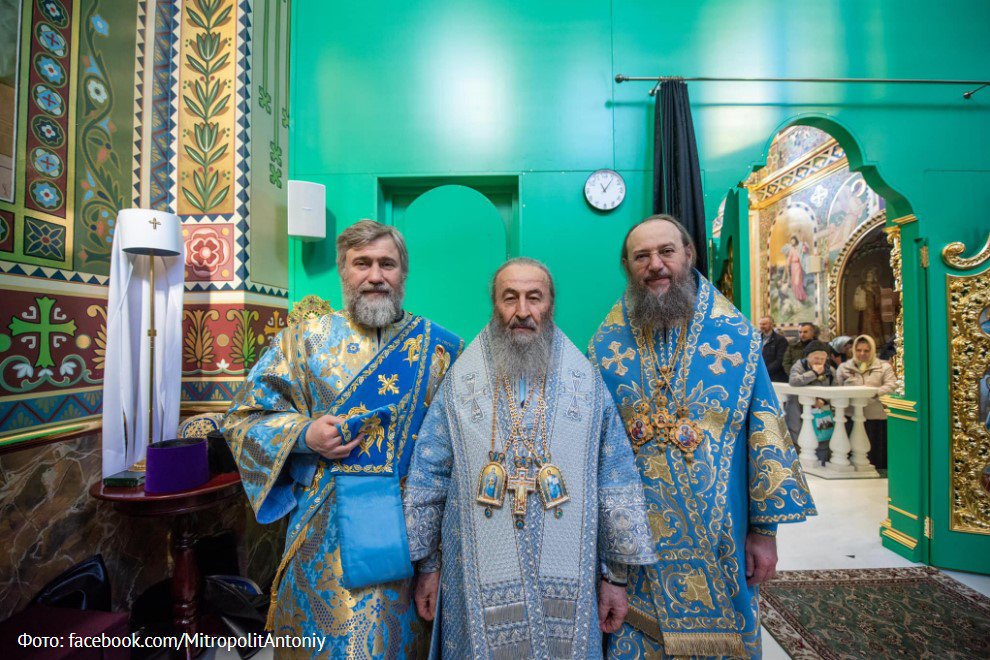
Deacon Vadim Novinsky, Metropolitan Onufriy, Metropolitan Antony (Pakanich)
The influence and modern views of the metropolitan can be vividly illustrated by the fact that preparations for the May Council were carried out without his involvement, even though this is exactly what the head of church affairs should be responsible for. Apparently, the organizers of the Council were so afraid of their own administrator that they decided to handle everything themselves. Incidentally, Novinsky participated in the mentioned May Synod, where he allegedly opposed efforts to pass a resolution condemning the actions of Patriarch Kirill. Evidently, his voice still carries weight with the current church leadership, as such a resolution was not adopted.
The State
There is a third, invisibly present entity in this story: the state — or more precisely, its absence.
The state's involvement in the religious life of the country is currently chaotic, sporadic, and extremely destructive. Where its intervention is needed, it is absent, and where it should simply stay out of the way, it suddenly appears and begins some strange, unnecessary activity.
Yes, there is a state body directly responsible for the state's policy in the religious sphere: the State Service for Ethnopolitics and its head, Olena Bohdan, around whom scandals constantly arise.
For instance, the Ukrainian Orthodox Church (UOC) often expresses the opinion that she is biased, while resources of the Ukrainian Orthodox Church of the Moscow Patriarchate (UOC-MP) may quote her when it suits them.
Just recently, on October 18, the Synod of the Orthodox Church of Ukraine (OCU) issued a statement that "in the communication from the leadership of the body that should be protecting Ukraine from Russian hybrid aggression in the religious sphere, narratives systematically appear that are fully consistent with the propaganda of the Moscow Patriarchate. These include accusations of 'seizing churches,' calling a religious organization with only 4% public support 'the largest,' and attempting to present the statements of this organization’s gatherings, which have not yet been fully officially published, as a supposed real decision to cease its subordination to the Moscow Patriarchate."
Indeed, if you look at Bohdan's statements, in many cases, they are in line with those of the Ukrainian Orthodox Church of the Moscow Patriarchate. This primarily concerns the interpretation of the right of a community to legally transfer from one denomination to another and who is considered the community.
Ms. Bohdan clearly and unequivocally states in this context that this right belongs to the religious community itself. Thus, her statements fully align with those of the UOC-MP. Another sensitive issue on which Bohdan's views align with those of the UOC-MP is the question of worship in the Kyiv-Pechersk Lavra. Ms. Bohdan, like representatives of the Moscow Patriarchate, quite unequivocally states that the UOC-MP representatives have more grounds to conduct services in this monastery. "Someone asked how many monks the OCU has in Kyiv? Less than 50. And how many monks are there in the Kyiv-Pechersk Lavra, belonging to the UOC? Over 200. In total, about 600 people reside in the Kyiv-Pechersk Lavra, including seminarians and academy professors," said the head of the State Service for Ethnopolitics.
This position of a state official, of course, has drawn sharp criticism from the OCU. "For more than four months, the registration of the statute of the Holy Dormition Kyiv-Pechersk Lavra within the Orthodox Church of Ukraine has been delayed under various formal pretexts. At the same time, the head of the service responsible for state-church relations makes public comments that discredit the Orthodox Church of Ukraine and protect the existing monopoly of the Moscow Patriarchate structure on worship in the Ukrainian shrine," reads a statement from the OCU Synod.
At the same time, the State Service for Ethnopolitics has completely distanced itself from sensitive issues such as the issue of collaboration among clergy and their unethical behavior.
Is such a policy coordinated with the President's Office? It is difficult to answer this question, as no evidence has been made public to confirm or deny such influences. However, it is worth noting that one of the deputy heads of the President's Office is Mr. Tatarov, the same lawyer of church oligarch Novinsky.
Overall, the current government does not have a systematic approach to religious matters. It seems more like attempts by individual officials to somehow influence church life with varying degrees of success.
Recently, a letter from the deputy head of the Main Directorate of the Security Service of Ukraine (SBU) in Kyiv and Kyiv region, Yuriy Palahniuk, to local authorities, became public. The letter discussed the need to conduct explanatory work among the public to prevent participation in gatherings of religious communities aimed at transitioning from the UOC to the OCU. Such a transition, according to the leadership of the Kyiv SBU, "creates preconditions for the destabilization of the socio-political situation in Kyiv and the region." However, after a public outcry, Palahniuk was suspended from his duties.
At the same time, the state has recently begun to pressure the leaders of the UOC-MP. For example, the abbot of the Kyiv-Pechersk Lavra, Pavel (Lebed), was held at the border for several hours while he was allegedly traveling to Moldova for a medical diagnosis. Border guards carefully inspected his luggage before he continued on his way. It should be noted that Moldova has been actively visited by both Ukrainian and Russian church figures until recently, and it may now be used as a platform for meetings and communications. The mentioned search of the previously "untouchable" metropolitan may indicate certain signals that the Ukrainian authorities are likely trying to send to the UOC-MP leadership.
It also became known about a search in the residence of Metropolitan Ionafan of Tulchyn and Bratslav. It was conducted as part of a case under Article 161 of the Criminal Code of Ukraine (violation of equality of citizens based on their racial, national affiliation, religious beliefs, disabilities, and other characteristics). No details of this case are known, and representatives of the UOC-MP claim that the metropolitan is involved in it as a witness.
Another interesting case involves the UOC-MP's communication with Russian prisoners of war. Someone in law enforcement, for some reason, decided to organize a special operation: bringing Russian prisoners to the Kyiv-Pechersk Lavra for a meeting with Metropolitan Onufriy.
"It is what it is," Onufriy characterized the Russian aggression against Ukraine.
The meeting turned out to be quite strange—Metropolitan Onufriy wished the captured occupiers "health and that the Lord returns you to your homeland…." He also noted that the war can be stopped, but "not by the power of weapons, not by the power of human truth, but by God's love." Many people noticed the phrase "it is what it is," which Onufriy used to describe the current Russian aggression against Ukraine, but his next statement was equally shocking: "May the Lord give our leaders (!) courage, wisdom, and understanding to find the word of love that can stop all evil."
In doing so, he placed Zelensky, the leader of the country under attack, and Putin, the very instigator of the aggression, on the same level. Therefore, it is still unclear what practical effect the organizers of this meeting expected.
But the unclear role of the UOC-MP in the issue of Russian prisoners of war does not end there. Most journalists likely remember the very characteristic image of a translator from Ukrainian to Russian for a convicted Russian war criminal, dressed in clothing typical of the believers of this denomination.
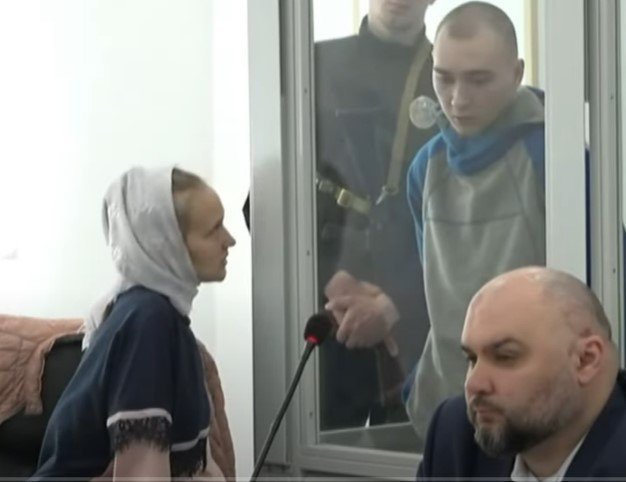
Amorphousness
The UOC-MP (Ukrainian Orthodox Church of the Moscow Patriarchate) cannot independently rid itself of the negative burden associated with some of its priests who remain under the influence of the "Russian world" ("russkiy mir"). It doesn't matter whether it's an open collaboration or a neutral position, which, in the current situation, clearly works against Ukrainian interests.
The internal traditions and rules are too strong, and the voices of decent people go unheard, especially when many in the church leadership sympathize with "russkiy mir" ideas. This is compounded by the long-standing "friendships" between church leaders and questionable oligarchs.
The lack of sufficient internal strength within the church to overcome its own issues, coupled with the state's paralysis or chaotic attempts to act in favor of lobbying groups, creates a situation where people simply do not see their future with this church and try to transition to the OCU (Orthodox Church of Ukraine). This is the root of the conflicts that occur almost daily across the country, with no end in sight.
One can talk endlessly about the rights of religious communities and how the transition to the OCU was staged by politicians or dishonest priests. However, according to polls, 54% of Ukrainians identify with the OCU, while only 4% with the UOC-MP. This shows that the majority of Orthodox Ukrainians want to belong to a church that is not amorphous, where a normal priest isn't overshadowed by a metropolitan collaborator, where some collect volunteer aid for soldiers on the front, while others claim that war is wrong. Instead, they seek a Ukrainian church where the thoughts of the laity, ordinary priests, and church leadership align, where true unity exists.
Texty.org.ua see no need to create another independent Orthodox church. The most logical development would be the mass transition of communities to the OCU, along with the criminal prosecution of collaborators and agents deeply entrenched in the UOC-MP.

